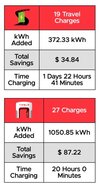In 2015, when I bought my Tesla Model S, critics with gas cars told me that no matter the 5 to 6 times higher efficiency of EV's, that the charging stations would just charge more for electricity, and we wouldn't benefit from the higher efficiency of EV's. They would take advantage, and we would pay the same per mile as if we had a gas car.
Were they right? Electrify America charges 43 cents per KWH. A 100KWH Tesla costs $43.00 for 100 KWH.
So, which goes further on $43 worth of fuel? An EV or a car with an internal combustion engine?
(Example: Comparing a highway trip where we need to buy from a charging station: A Toyota Corolla does 40 MPG highway, and $43 today would buy 17 gallons of fuel in my town, so 40 times 17 is 680 miles. The Long Range Tesla Model S goes 412 miles on 100KWH for $43.)
Were they right? Electrify America charges 43 cents per KWH. A 100KWH Tesla costs $43.00 for 100 KWH.
So, which goes further on $43 worth of fuel? An EV or a car with an internal combustion engine?
(Example: Comparing a highway trip where we need to buy from a charging station: A Toyota Corolla does 40 MPG highway, and $43 today would buy 17 gallons of fuel in my town, so 40 times 17 is 680 miles. The Long Range Tesla Model S goes 412 miles on 100KWH for $43.)




